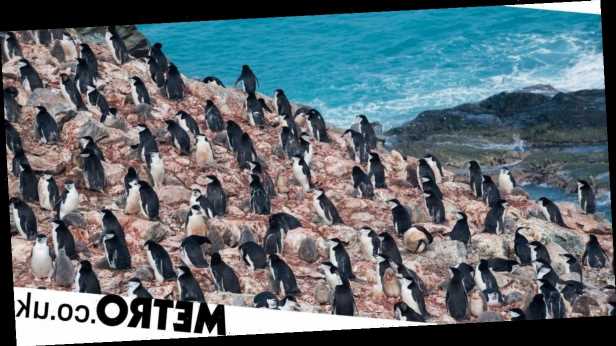Numbers of chinstrap penguins have fallen by almost three fifths in half a century in an important Antarctic habitat for the birds, scientists said.
Every colony surveyed on Elephant Island, north east of the Antarctic peninsula, had seen numbers of breeding pairs drop since the last survey in 1971, with some populations declining as much as 77% over that time.
Overall, the number of chinstrap penguins on Elephant Island has fallen by almost 60%, from 122,550 breeding pairs recorded in the survey 50 years ago to 52,786 today – with climate change thought to be behind the drop.
The researchers from Stony Brook University and Northeastern University in the US joined a Greenpeace expedition to the region, and surveyed chinstrap penguins on the important habitat of Elephant Island.
Reduced sea ice and warmer oceans, as a result of climate change, is thought to have led to less krill, the small shrimp-like creatures that the penguins primarily feed on.
Dr Heather J Lynch, from Stony Brook University and one of the expedition’s research leads, said: ‘Such significant declines in penguin numbers suggest that the Southern Ocean’s ecosystem has fundamentally changed in the last 50 years, and that the impacts of this are rippling up the food web to species like chinstrap penguins.
‘While several factors may have a role to play, all the evidence we have points to climate change as being responsible for the changes we are seeing.’
The new research has been published after a new record high temperature of 18.3C (64.9F) was reported in Antarctica, beating the former record of 17.5C (63.5F) which was set in March 2015.
Louisa Casson, Greenpeace Oceans Campaigner, said: ‘Penguins are an iconic species but this new research shows how the climate emergency is decimating their numbers and having far-reaching impacts on wildlife in the most remote corners of Earth.’
And she urged: ‘2020 is a critical year for our oceans.
‘Governments must respond to the science and agree a strong Global Ocean Treaty at the United Nations this spring, that can create a network of ocean sanctuaries to protect marine life and help these creatures adapt to our rapidly changing climate.’
Source: Read Full Article

